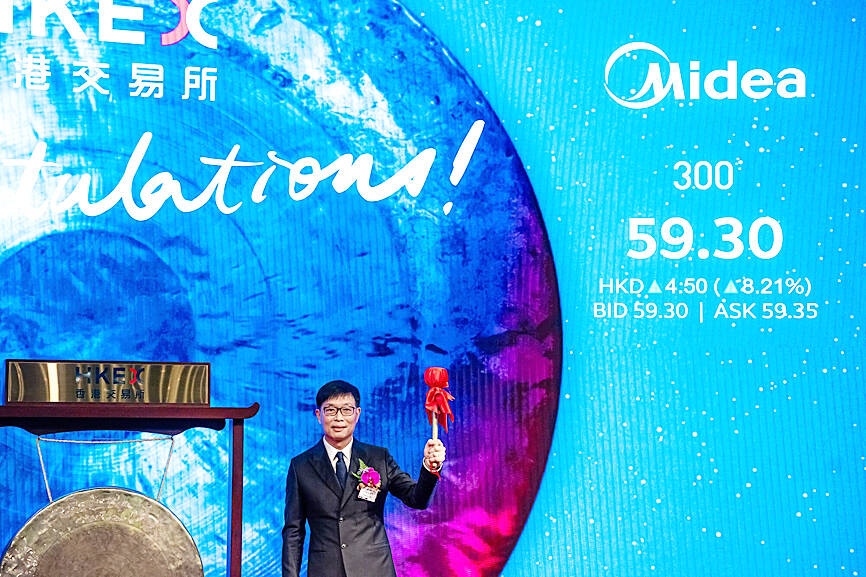Shares in Chinese electronic appliance maker Midea Group Co (美的集團) yesterday closed nearly eight percent higher on its Hong Kong debut, having raised about US$4 billion in the territory’s biggest initial public offering (IPO) in more than three years.
The firm closed at HK$59.1 following early exchanges where it spiked to HK$60.0, up from its HK$54.8 list price, which was at the top of the range indicated in its prospectus.
Midea’s bumper listing fueled hopes that the Hong Kong stock exchange can attract more top Chinese firms and regain its crown as the world’s top venue for IPOs.

Photo: Bloomberg
The Chinese finance hub has suffered a steady decline in new offerings since a regulatory crackdown by Beijing starting in 2020 led some Chinese mega-companies to put their plans on hold.
The territory had just 30 IPOs in the first half of this year, compared with more than 100 annually between 2013 and 2020.
“If this manages to hold on to gains for the week, it would definitely create a better IPO environment, paving the way for more to come,” Rockpool Capital Ltd (摩石資本) chief investment officer Benjamin Wong (黃務騰) told Bloomberg News.
Midea’s IPO has eclipsed the combined valuation of all of Hong Kong’s new listings so far this year, and is the territory’s largest since JD Logistics Inc (京東物流) and Kuaishou Technology (快手) in the first half of 2021.
The Foshan-based company last week expanded the number of shares on offer by about 15 percent to 566 million — an indicator of strong demand.
In a filing to the Hong Kong Stock Exchange on Monday, it said the international portion of the IPO was subscribed by more than eight times, before taking into account the adjustment to the offer size.
Midea chairman Paul Fang (方洪波) called the listing “a strategic step forward in the company’s globalization,” the South China Morning Post reported yesterday.
Cornerstone investors, including a subsidiary of Cosco Shipping Holdings Ltd (中遠海運控股) and part of UBS Asset Management Singapore Ltd, agreed to buy Midea stocks worth US$1.26 billion.
Founded in 1968, Midea has become one of the world’s largest sellers of home appliances such as washing machines and air conditioners and it also owns the German industrial robot maker Kuka AG.
Last month it reported a 14 percent rise in net profit in the first half of this year despite weakening consumer spending due to China’s economic slowdown, while revenue hit US$52.7 billion.
The company’s shares in Hong Kong were offered at a 20 percent discount compared to its stock price in Shenzhen, China, where it has been listed since 2013.
Hong Kong’s stock exchange received a boost earlier this year after Chinese regulators unveiled measures to support the territory’s status as a finance hub.
The exchange’s operator would also change its policy this month to keep trading through typhoons and heavy storms, in a bid to raise competitiveness.

When an apartment comes up for rent in Germany’s big cities, hundreds of prospective tenants often queue down the street to view it, but the acute shortage of affordable housing is getting scant attention ahead of today’s snap general election. “Housing is one of the main problems for people, but nobody talks about it, nobody takes it seriously,” said Andreas Ibel, president of Build Europe, an association representing housing developers. Migration and the sluggish economy top the list of voters’ concerns, but analysts say housing policy fails to break through as returns on investment take time to register, making the

‘SILVER LINING’: Although the news caused TSMC to fall on the local market, an analyst said that as tariffs are not set to go into effect until April, there is still time for negotiations US President Donald Trump on Tuesday said that he would likely impose tariffs on semiconductor, automobile and pharmaceutical imports of about 25 percent, with an announcement coming as soon as April 2 in a move that would represent a dramatic widening of the US leader’s trade war. “I probably will tell you that on April 2, but it’ll be in the neighborhood of 25 percent,” Trump told reporters at his Mar-a-Lago club when asked about his plan for auto tariffs. Asked about similar levies on pharmaceutical drugs and semiconductors, the president said that “it’ll be 25 percent and higher, and it’ll

NOT TO WORRY: Some people are concerned funds might continue moving out of the country, but the central bank said financial account outflows are not unusual in Taiwan Taiwan’s outbound investments hit a new high last year due to investments made by contract chipmaker Taiwan Semiconductor Manufacturing Co (TSMC, 台積電) and other major manufacturers to boost global expansion, the central bank said on Thursday. The net increase in outbound investments last year reached a record US$21.05 billion, while the net increase in outbound investments by Taiwanese residents reached a record US$31.98 billion, central bank data showed. Chen Fei-wen (陳斐紋), deputy director of the central bank’s Department of Economic Research, said the increase was largely due to TSMC’s efforts to expand production in the US and Japan. Investments by Vanguard International

WARNING SHOT: The US president has threatened to impose 25 percent tariffs on all imported vehicles, and similar or higher duties on pharmaceuticals and semiconductors US President Donald Trump on Wednesday suggested that a trade deal with China was “possible” — a key target in the US leader’s tariffs policy. The US in 2020 had already agreed to “a great trade deal with China” and a new deal was “possible,” Trump said. Trump said he expected Chinese President Xi Jinping (習近平) to visit the US, without giving a timeline for his trip. Trump also said that he was talking to China about TikTok, as the US seeks to broker a sale of the popular app owned by Chinese firm ByteDance Ltd (字節跳動). Trump last week said that he had